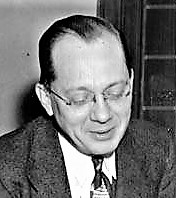Barclay Leathem - A leading pioneer in America's drama education
10217 Lake Shore Boulevard

For fifty years, Barclay Leathem shaped theater education at Western Reserve University (later Case Western Reserve University) and was a leader in the field across America. Among his contributions was finding the university’s Department of Drama and Theatre, obtaining a Rockefeller Foundation Grand to build the Eldred Theatre, establishing the first television college courses, and developing working relationships that made him known to prominent politicians, lawyers, business people, journalists, and sports figures.
A native of Philadelphia, Barkley Spencer Leathem, was born in 1900. He received a bachelor of arts degree from Pennsylvania State University and a bachelor of laws degree from Western Reserve University.
When he entered WRU law school in 1921, he was also engaged in teaching undergraduate English and public speaking and directing the Sock ‘n’ Buskin Club. (The name comes from the footwear used in ancient Greek theatre. The sock refers to a soft shoe worn by actors in comedies while a buskin was a stiff shoe worn in more serious drama.)
After finishing law school, he decided to keep teaching English and speech instead of practicing law, partly because of encouragement to enlarge the drama program.
Barclay married his wife, Ruth, in 1922, who also influenced him. She was a fellow graduate of Pennsylvania State University and had gone through law school with him and shared his interest in the theater. She became a specialist in theater makeup, and they worked together until her death.
In 1929, Mr. Leathem spent a year in Vienna studying with the famous producer and director Max Reinhardt, who, according to Leathem, influenced everything he did.
The theatre remained an extracurricular activity until 1931, when Mr. Leathem became an associate professor and founded the Department of Drama and Theatre. The department initially offered theater courses at the graduate level and established the University Players. It would take several more years before Western Reserve offered theater to undergraduates.
Leathem brought avant-garde theater to Case with his first production of August Strindberg’s Spook Sonata in 1939, after Eldred added a new stage with a $35,000 gift from the Rockefeller Foundation in 1938.
Mr. Leathem believed in making full use of community resources. From the beginning of the university’s graduate program in theater, the students tried out for parts in Cleveland Playhouse production, and the program had a working arrangement with Karamu Theater.
In 1940, Barclay spent a semester visiting colleges and community theaters in forty-six states.
At the suggestion of an Army officer who foresaw the United State’s entry into World War II, Mr. Leathem went to Washington and applied considerable persuasion to get theater included in the War Department’s recreation division. Mr. Leathem became a civilian consultant to the Joint Army and Navy Committee on Welfare and Recreation culminating in programs know as soldiers’ shows.
When Irving Berlin was at his wits’ end with Army red tape as he was preparing and rehearsing “This is the Army,” Mr. Leathem was called in to smooth over the difficulty.
Western Reserve University made Leathem a full professor in 1942. During that same year, when he heard about the experimental General Electric Company television station at Schenectady, New York, he changed one of the university rooms into a TV workshop with dummy cameras. Two years later, an original play by one of the students was rehearsed and taken to Schenectady.
When Cleveland’s first television station, WEWS Channel 5, was preparing to open in 1947, Mr. Leathem joined the staff as a consultant. For years the drama department put on a half-hour Sunday show called Perspective, about University Circle. The university offered one of the first TV courses in the country due to its drama chairman’s foresight. He conducted an interview-talk shoe on WEWS for about fifteen years.
Barkley Leathem emphasized community concepts of drama. He directed City Club Anvil Revues, Ribs and Roasts, Junior League shows, and Hermit Club productions.
Mr. Leathem was president of the American Educational Theater Association in 1937 and was a founder, president, and executive secretary of the National Theater Conference from 1936 to 1961.
He delighted in travel, reading, good conversation, and good food and was a past president of the Cleveland Cooking Club. He was a member of the Rowfant Club, the Hermit Club.
When Barclay Leathem became eligible for retirement in March 1970, he asked the university president if he could remain on for another year. He told him, “It would mean so much to me to have been a member of the same faculty for fifty years. He graciously assented”
Professor Leathem became the first to have been a member of the Case Western Reserve University faculty for fifty years.
Barclay Leatham had Parkinson’s disease for several years, but his health deteriorated following his wife’s death in August 1980. Leatham died on February 2, 1981, at Lakeside Hospital.
